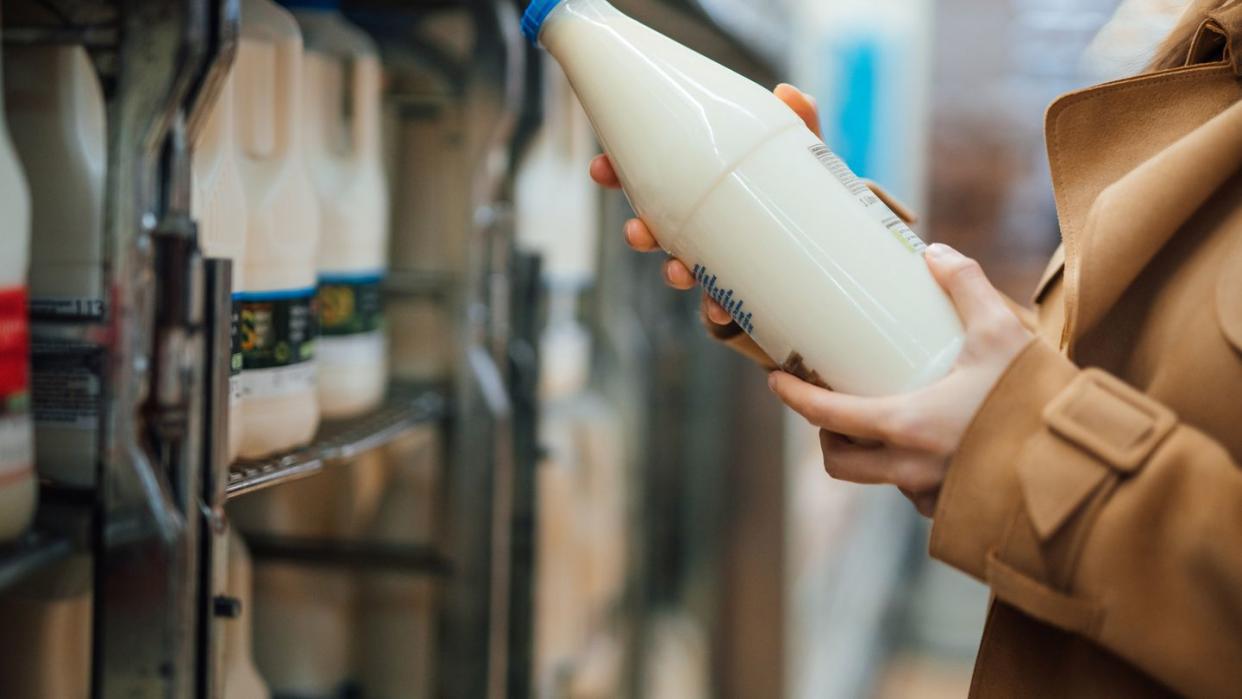Traces Of Bird Flu Have Been Found In Milk. Here's Why Experts Say You Shouldn't Worry

"Hearst Magazines and Yahoo may earn commission or revenue on some items through these links."
Bird flu has been popping up in headlines for months. And you may have heard that the virus has been detected in dairy cows in eight states: Idaho, Kansas, Michigan, New Mexico, North Carolina, South Dakota, Ohio and Texas.
Now, the Food and Drug Administration (FDA) is sharing that traces of bird flu have been detected in commercially-available milk.
The FDA made the announcement in an update on highly pathogenic avian influenza (HPAI, aka bird flu or H5N1). In the update, officials shared that there was inactivated genetic material from the virus detected in milk that’s sold in stores. Meaning, the virus is there, but it’s dead.
The news comes just weeks after public health authorities revealed that a person in Texas contracted bird flu from a cow. Bird flu is not common in people and has only been detected twice in the U.S., but it can be deadly, according to the Centers for Disease Control and Prevention (CDC). In the U.S., cases have always been mild.
Meet the Experts: Darin Detwiler, LPD, is an associate teaching professor of food policy at Northeastern University and author of Food Safety: Past, Present, and Predictions. William Schaffner, MD, is an infectious disease specialist and professor at the Vanderbilt University School of Medicine. Mohamed Zeyada Satti, PhD, assistant professor in the Department of Microbiology, Genetics, & Immunology at the College of Veterinary Medicine at Michigan State University.
If you’re suddenly giving that container of milk in your fridge the side-eye, experts say there’s no need to panic. Here’s why.
Is pasteurized milk safe to drink?
Pasteurization is a process of heating milk to a high-enough temperature for a long-enough time to kill harmful germs, the CDC explains. Milk that’s sold in stores is required to be pasteurized, according to FDA regulations. So, the milk you buy is highly likely to be pasteurized.
“Pasteurized milk is indeed safe to drink,” says Darin Detwiler, LPD, an associate teaching professor of food policy at Northeastern University and author of Food Safety: Past, Present, and Predictions. “At this time, there is no evidence that H5N1 bird flu virus can survive the pasteurization process. Therefore, consumers can feel confident about the safety of pasteurized milk.”
Milk from cows that have been found to be infected is also destroyed, and herds are regularly being tested over bird flu concerns, points out William Schaffner, MD, an infectious disease specialist and professor at the Vanderbilt University School of Medicine.
If you live in a state where bird flu has been detected in cows, don't worry. "There is no risk in consuming dairy product in these states," says Mohamed Zeyada Satti, PhD, assistant professor in the Department of Microbiology, Genetics, & Immunology at the College of Veterinary Medicine at Michigan State University.
Is unpasteurized milk safe to drink?
Unpasteurized milk, aka “raw” milk, is a different story. This milk doesn’t go through the pasteurization process. “Therefore, it can pose a higher risk of containing various pathogens, including bacteria and viruses,” Detwiler says. “While there is no current evidence directly linking raw milk with H5N1 transmission, the general lack of pasteurization increases the risk of harboring infectious agents.”
FWIW, raw milk is labeled as a “public health concern” by the CDC.
Which states have bird flu in milk?
So far, bird flu has been detected in dairy cows in eight states, according to the U.S. Department of Agriculture (USDA):
Idaho
Kansas
Michigan
New Mexico
North Carolina
South Dakota
Ohio
Texas
As a result, the USDA is ordering dairy cows to be tested for bird flu before they can be moved between state lines.
Are eggs safe from bird flu?
In general, yes. “Eggs are considered safe from bird flu as long as they are properly handled and cooked,” Detwiler says. “H5N1, like other viruses, is sensitive to heat.”
Cook eggs until the yolk and white are firm to make sure that any viruses that could be in the eggs are inactivated, he says. “Consumers should also practice good kitchen hygiene, such as washing hands and surfaces that have come into contact with raw eggs,” Detwiler says.
What else should I know about bird flu?
Detwiler stresses that it’s unlikely you’ll get bird flu from eggs or milk. “Bird flu is primarily spread through direct contact with infected birds, and it is not typically transmitted through the consumption of properly cooked poultry or eggs,” he says.
Schaffner agrees. “There’s no need to panic or avoid milk, dairy products, and eggs,” he says. Still, he adds that it’s “good to be informed and, as new information develops, be open to new messages from public health.”
You Might Also Like

